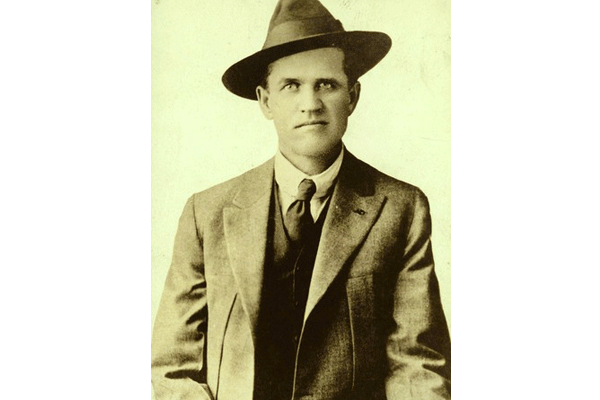Always On Strike: Frank Little and the Western Wobblies
Frank Little was known as the "hobo agitator," and he was beloved by the train-hopping men that worked seasonally in every kind of hard labor all across the sprawling West. He created safe, clean hobo jungles
along the freight yards, places free of drugs and alcohol where people could stay for a time. He was in the mines, and in the fields, and on the picket lines urging employees to band together and stand strong in the strike. But he was perhaps most famous for his free-speech fights. Any town which tried to ban labor organizing in public places - and many did when the IWW arrived - would find itself swarmed by an army of free-speech warriors, and Frank Little reading the Declaration of Independence to them on the street corner in defiance of the law. When the police came, he shouted that they ought to consider their low pay and 10 hour workdays and go out on strike too. The free-speech army filled the jails, over-filled them, and then were released to immediately resume their illegal soapboxing - tactics later used in civil rights and independence struggles all around the world. He was a principled opponent of all wars, and when government threats and public umbrage caused others in the union to quail and compromise on draft registration, he stood resolutely against it, whatever the cost:
They'll run us out of business anyhow. Better to go out in a blaze of glory than to give in. Either we're for this capitalist slaughter fest or we're against it. I'd rather take a firing squad.

He was half-Quaker, half-Cherokee; one eye was glass; he always wore his Stetson cocked at the same jaunty angle; his mouth was set in a twisted, aggressive half-grin; and he sometimes was forced to limp along on crutches. He was a frail man supporting the weight of his body with the aid of crutches, his face contorted with physical pain and the passion which rocked his body, the speaker worked himself into a maniacal fury . . .
This was the man who went to Butte in the summer of 1917 to organize and support the striking miners. His friend Ralph Chaplin, seeing him off from Chicago, said It's a fine specimen the IWW is sending into that tough town . . . One leg, one eye, two crutches - and no brains!
Little laughed and replied:
Don't worry, fellow worker, all we're going to need from now on is guts.
In Butte, six masked men broke in and pulled him out of the bed of the inn where he was staying, dragged him behind their car, beat him savagely, mutilated him, and hanged him from a railroad trestle. A young company security man by the name of Dashiell Hammett was also in Butte at the time, and, though it does not seem that he was among the murderers himself, it very likely was his coworkers that were behind the masks. The episode made a profound impression on Hammett, and its echoes can be found throughout the novels he later wrote, most notably his first, Red Harvest.
This is the man - Frank Little - that my wife and I once seriously considered writing a biography about; none had been written, and his fearlessness and success as an organizer over an approximately 15 year period, and his ultimate martyrdom, leapt vividly off the page, even when it was scattered throughout the middle of Volume 4 of Philip Foner's excellent (but now little read) epic, History of the Labor Movement in the United States, first published in 1965.
The problem, we discovered, was that very little was known about Little. He left no personal papers and a scant paper trail; contemporary accounts were appallingly unreliable. The trail was so faint we ultimately gave it up.
Arnold Stead didn't, and his recent biography Always On Strike: Frank Little and the Western Wobblies (2014) defies these limitations to create a book that, though it does not much expand the existing research, is nonetheless a compelling and much needed portrait of one of the most interesting organizers in American history. Stead recognizes the limits of his sources. As he says in the introduction, there is little known about Frank Little before he springs to life as an Arizona member of the Western Federation of Miners in 1900
by which time he was probably already 21 - and even later his movements and activities are difficult to pin down. The biographer is left guessing and speculating to fill significant gaps, and he does so with plausibility and restraint.
I think the book is a decent introduction for those that don't know much about the Wobblies to get acquainted with one of their most interesting figures, outlining the formation of the IWW from the WFM, the free speech fights, the hobo havens, the agricultural workers organization, the mine strikes, the confusion of IWW policy on the WWI draft, and the final ignominity of the kangaroo conspiracy trial.



Pursuant to MRPC 7.4(a)(2) FREE BACKGROUND INFORMATION AVAILABLE UPON REQUEST
This site is for general information only, and creates no attorney-client relationship. Sending inquiries to the firm does not create an attorney-client relationship. By calling or emailing the firm, you are consenting to receive return calls, emails, mailings and text messages from the firm.
To get legal advice about an employment law, labor law, federal employee law, whistleblower protection, labor unions, worker cooperatives, immigration, discrimination, harassment, wrongful termination, severance, or any related question, you must first have a conflicts check by the firm. We represent exclusively workers, worker cooperatives and unions, but we still must check for potential conflicts of interest, for example, between a supervisor and employee.
First provide the firm with your name, and the name of the person you are making claims against. This allows the firm to check for such conflicts of interest. Until you receive confirmation that there is NO CONFLICT, none of the information you provide will be considered confidential. Do NOT provide any confidential information before we have asked you to do so.
Once we have confirmed there is no conflict, you may discuss your matter with staff in a little more detail, and, if requested, make an appointment. If at your appointment the firm accepts you as a client in writing, then the attorney will be able to provide you with employment law advice.
.
.
.